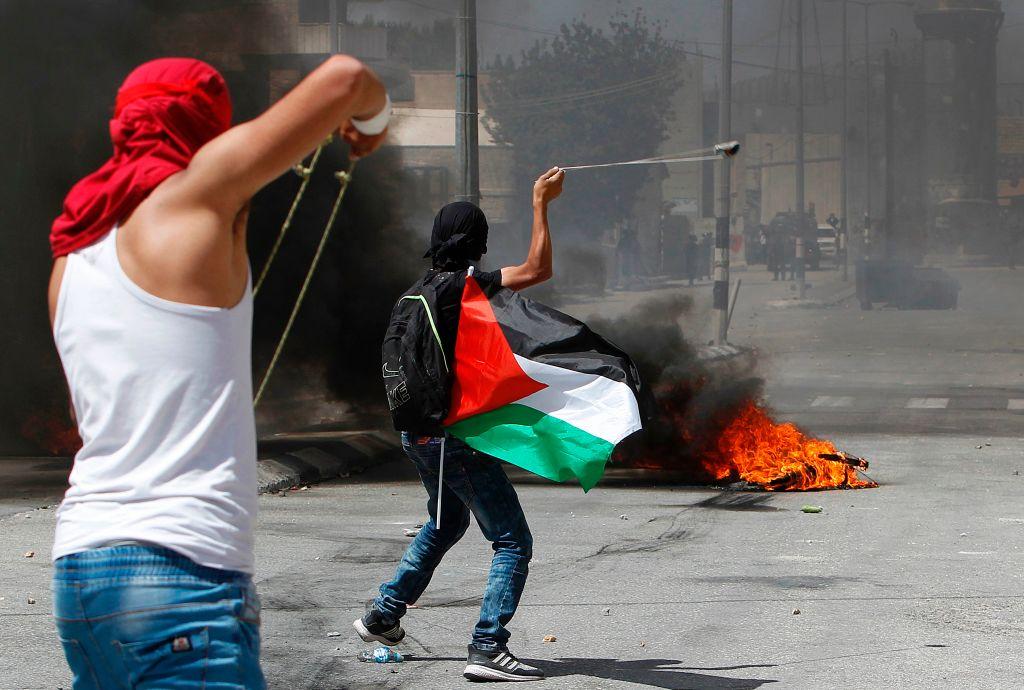Nakba: Palestinians marching for 'Day of Catastrophe' wounded in clashes with Israeli army
At least 11 hospitalised as Palestinians mourn the founding of Israel, known as the Nakba – ‘the catastrophe’ – in Arabic

Your support helps us to tell the story
From reproductive rights to climate change to Big Tech, The Independent is on the ground when the story is developing. Whether it's investigating the financials of Elon Musk's pro-Trump PAC or producing our latest documentary, 'The A Word', which shines a light on the American women fighting for reproductive rights, we know how important it is to parse out the facts from the messaging.
At such a critical moment in US history, we need reporters on the ground. Your donation allows us to keep sending journalists to speak to both sides of the story.
The Independent is trusted by Americans across the entire political spectrum. And unlike many other quality news outlets, we choose not to lock Americans out of our reporting and analysis with paywalls. We believe quality journalism should be available to everyone, paid for by those who can afford it.
Your support makes all the difference.Palestinians commemorating the creation of Israel have clashed with Israeli security forces across the occupied West Bank, leaving several people wounded.
Marches are held across the Palestinian Territories every 15 May to mark the creation of the Israeli state, an event known as the Nakba or “catastrophe” to Palestinians and much of the Arab world.
Thousands joined the march route through the West Bank city of Ramallah on Monday carrying flags and keys to symbolise the homes lost when around 700,000 Palestinians were forced to flee their homes during the exodus of 1948.
5 June 2017 also marks 50 years since the Six-Day War, in which Israel annexed parts of the West Bank, in a move never recognised by the international community. It is feared the anniversary could lead to further tensions next month.
Dozens of young people threw rocks at Israeli security forces at a checkpoint on the outskirts of the city, to which the soldiers responded with rubber bullets and riot control spray. A Palestinian medic told AFP news agency that 11 people had been hospitalised after being hit with rubber bullets but the extend of their injuries was not known.
“For the sake of my future and to return to my family's land, I don't want any more useless negotiations but the path of resistance and the rifle,” Ahmed al-Bedu, a gangly 15-year-old Palestinian who holds Jordanian citizenship, told Reuters in Ramallah.
In Bethlehem, hundreds of people threw rocks at soldiers guarding Rachel’s Tomb, a site venerated by both Jews and Muslims, and were met with tear gas and stun grenades.
There were also clashes causing an unknown number of injuries and arrests outside a refugee camp near Hebron and in Jerusalem.
In other developments, a shell fired from Gaza exploded in an unpopulated area of Israel, causing no damage or injuries, the Israel Defence Force (IDF) said. The Gaza Strip is ruled by militant group Hamas, but no immediate claim of responsibility was made.
While former US Secretary of State John Kerry is visiting the region later this week to resurrect long-stalled peace talks, the Palestinian insistence on the right to return to homes their families fled 65 years ago remains a stumbling block in any deal to end the conflict.
Israel has consistently rejected the Palestinian demand, maintaining it would mean the end of the Jewish nature of the state.
Israel declared its independence from British rule over Palestine on 14 May 1948, which led to a sharp increase in the fighting already raging between local Jews and Arabs which forced many to abandon their homes and seek asylum in neighbouring countries.
Today there are an estimated 5.3 million Palestinian refugees outside the Territories, most of whom reside in countries in the region which refuse to grant them citizenship.
Join our commenting forum
Join thought-provoking conversations, follow other Independent readers and see their replies
Comments